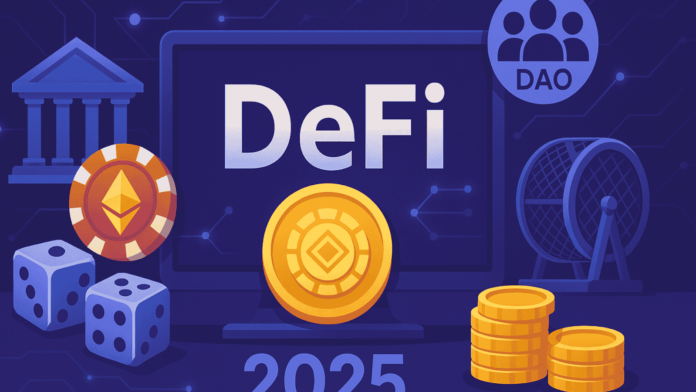- Decentralized gambling is becoming a mainstream reality
- Tokenized betting enables faster, cheaper, and borderless play
- DAO governance and fair play tools give power back to players
In 2025, a quiet revolution is underway in the online gambling world. Decentralized finance (DeFi) has not only disrupted traditional banking—it’s now beginning to redefine how casinos operate. From permissionless platforms to fully transparent smart contracts, the era of DeFi-powered gambling is here, and it’s changing everything from payouts to how players place bets.
What Is DeFi Gambling and How Does It Work?
DeFi casinos leverage blockchain technology to remove intermediaries from gambling operations. Traditional online casinos are opaque in terms of payout odds, fund management, and back-end operations. DeFi casinos, on the other hand, are built on smart contracts that run on blockchains like Ethereum, BNB Chain, or Polygon. These contracts automate every transaction, from placing a bet to distributing winnings.
Because these platforms are decentralized, there’s no central authority controlling the funds. Users interact directly with smart contracts using their Web3 wallets. They can see the code, verify odds, and track all transactions in real time on-chain. Trust becomes algorithmic rather than institutional.
Tokenized Betting: A New Frontier for Digital Wagers
Tokenized betting is another major trend reshaping the space. In this model, players wager using tokens specific to a platform or ecosystem. For example, platforms may use native tokens like BET, GAME, or even stablecoins such as USDC to enable fast, fee-minimised transactions.
The advantage? Speed, privacy, and reduced costs. Smart contracts execute bets instantly, often with zero or near-zero gas fees depending on the chain. And because many DeFi casinos operate globally, tokenized betting allows for seamless cross-border participation without dealing with fiat conversion or payment processor fees.
Benefits of DeFi-Powered Casinos for Users
DeFi casinos offer numerous benefits that set them apart from traditional platforms. The most obvious is transparency. Every transaction, bet, and payout is recorded on a public ledger. There’s no room for manipulation or hidden rules. Players can review the smart contract’s code before betting.
Liquidity and control are other significant advantages. Users retain full custody of their funds and can deposit or withdraw without waiting for approval. Many platforms even allow staking or yield farming, giving users the opportunity to earn passive income alongside active gameplay.
Another compelling feature is provably fair gaming. Random Number Generators (RNGs) in DeFi casinos are typically open-source and verifiable, which allows players to confirm the fairness of every roll, spin, or card draw. This is a game-changer in an industry long plagued by accusations of manipulation.
Challenges Still Facing the DeFi Gambling Space
Despite the innovation, DeFi casinos are not without challenges. Regulatory uncertainty remains a looming issue. While decentralized platforms aim to be borderless, global regulators are still trying to catch up, and increased scrutiny could change how these platforms operate or interact with users in the future.
User experience also remains a hurdle. While DeFi-savvy users may feel at home navigating Web3 wallets and approving smart contract interactions, mainstream gamblers still find it intimidating. Simplifying onboarding without compromising decentralization is an ongoing goal.
Another area of concern is volatility. Using native platform tokens that are prone to major price swings introduces risk for players who don’t want their winnings cut in half overnight. Some platforms are beginning to adopt stablecoin-only betting models to reduce this problem.
The Rise of Hybrid Models and DAO Governance
To bridge the gap between decentralization and usability, several platforms are now adopting hybrid models. These combine the security and transparency of DeFi with the familiarity of centralized interfaces. For example, a user might log in with a simple Web2 account but interact with a non-custodial smart contract for betting.
DAO governance is also becoming increasingly common. Many DeFi casinos issue governance tokens that let users vote on protocol upgrades, game additions, and even revenue-sharing structures. This community-driven model is reshaping the business side of online gambling and redistributing power.
Examples of DeFi Casino Innovation in 2025
Several standout platforms are leading the charge in 2025. Projects like Rollbit, BetSwirl, and Wagerr have implemented on-chain betting mechanisms with staking pools and DAO governance. Others like ZKasino are experimenting with zero-knowledge technology to combine privacy and transparency in unprecedented ways.
Interoperability is also improving. Bridges between chains now allow players to bet with assets across ecosystems, while Layer-2 scalability upgrades have significantly reduced costs and boosted performance. We’re also seeing the emergence of metaverse casinos where players can wager and socialise using VR avatars—all powered by DeFi protocols underneath.
What the Future Holds for Tokenized Gambling
As more users grow comfortable with Web3, the appeal of DeFi casinos will likely expand. The growth of Layer-2 solutions, zkRollups, and cross-chain liquidity is reducing friction and making decentralized gambling more accessible. If regulatory frameworks align to support innovation without compromising user freedom, DeFi-powered gambling could become a dominant force in the next wave of online entertainment.
Tokenized betting will also evolve, with more platforms issuing unique utility tokens that do more than just facilitate wagers. Expect tokens to represent VIP tiers, grant voting power, or unlock exclusive games and tournaments.
Conclusion
The world of online gambling is at a tipping point. DeFi-powered casinos and tokenized betting are dismantling the old systems and replacing them with transparent, efficient, and user-driven models. The technology is here, the users are arriving, and the momentum is building.
For those watching the convergence of blockchain and gaming, one thing is clear: the future of gambling won’t be dictated by house odds, but by code, community, and creativity.


